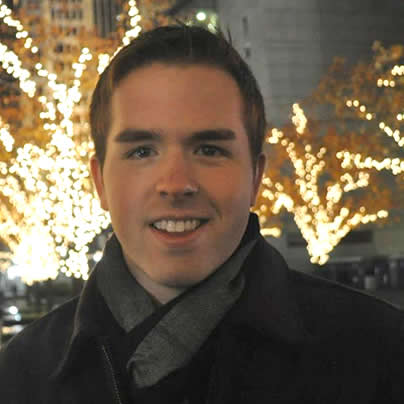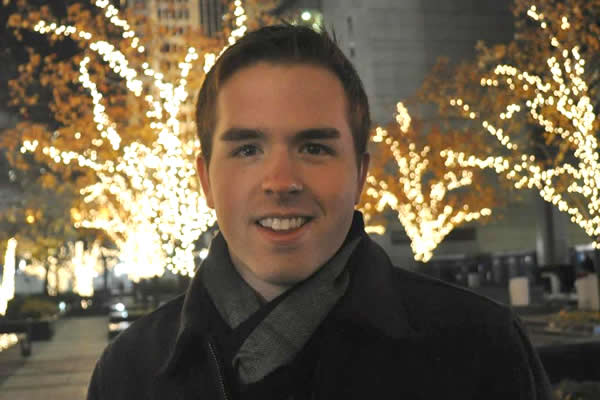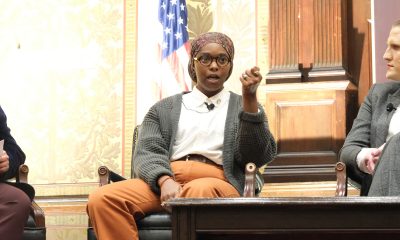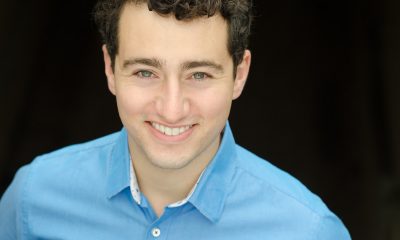Local
No LGBT group at Catholic U.
Announcement follows Notre Dame move to recognize similar org


Ryan Fecteau spearheaded efforts to prompt Catholic University officials to recognize CUAllies. (Photo courtesy of Ryan Fecteau)
Catholic University of America announced last week it would not officially recognize an LGBT student organization.
Ryan Fecteau, a junior who is the first openly gay speaker of the D.C. campus’ Student Association General Assembly, told the Washington Blade that CUAllies submitted its proposal for formal recognition to administrators on Feb. 21. Dean of Students Jonathan Sawyer and Katie Jennings, director of campus activities, told Fecteau, who spearheaded the effort, in a Dec. 6 meeting the university had denied CUAllies’ request “out of fear that they would become an advocacy organization.”
“It is unfortunate the Catholic University of America is not providing space for gay, lesbian, bisexual, transgender, questioning of whatever to feel they are welcomed into the faith community on campus,” Fecteau said.
The university, which denied to officially recognize the group after it formed in 2009, told the Blade in a statement the two administrators who met with Fecteau “expressed their appreciation for the thoughtful and respectful way in which CUAllies had pursued its request for recognition.” According to the statement, the goal “articulated by CUAllies of fostering a safe and welcoming environment for all students is shared by the university.”
Catholic University President John Garvey on Dec. 6 met with 15 student leaders and seven administrators to “engage in dialogue with them on that topic and to share ideas about how the university can better demonstrate its support for all students, whether they identify themselves as heterosexual, gay or lesbian.” Fecteau stressed to the Blade that CUAllies did not discuss marriage rights for same-sex couples in their petition for formal recognition.
“In declining the request for official university recognition of CUAllies, the administrators indicated their belief that, in spite of the group’s stated intent to uphold Catholic Church teachings, it would be extremely difficult for that pledge to be honored over time,” the university’s statement read. “They pointed out that there is a fine line, easily crossed, between a group dedicated to education and support of individuals who identify themselves as homosexuals and one that engages in advocacy on behalf of a homosexual lifestyle.”
Catholic University’s decision to not recognize CUAllies came 24 hours after University of Notre Dame President Rev. John I. Jenkins accepted recommendations from the school’s Office of Student Affairs to expand support to LGBT and questioning students. This decision will include formally recognizing an LGBT student group as an on-campus organization.
“A lot of people were very, very shocked and I think that’s a very good thing,” Alex Coccia, a junior Africana and peace studies major at Notre Dame who prompted the effort, told the Blade. “It was definitely something that not many people were expecting.”
A handful of other Catholic universities have LGBT-specific clubs, student affairs offices and even resource centers. These include Georgetown University in D.C. and Loyola and DePaul Universities in Chicago.
“Despite the contradictory decisions announced last week, it is undeniable that progress is being made on religiously affiliated campuses across the country,” Shane Windmeyer, executive director of Campus Pride, said in a statement released after Catholic University administrators announced they would not formally recognize CUAllies. “Students at the University of Notre Dame and the Catholic University of America, among others, are doing incredible work to make higher education a more inclusive place for all. Campus Pride has worked over the years to assist these students and alumni to continually push forward and we are very proud to support them. We call on the Catholic University of America to recognize the value of these students’ efforts and the importance of ensuring their academic success, support, and safety on campus.”
Coccia also criticized the D.C. university’s decision.
“It’s really disappointing,” he said. “[CUAllies] essentially has the same purpose as what our group was and what the organization will be.”
As for CUAllies, Fecteau said the group and university officials have agreed to continue to discuss the possibility of formal recognition.
“We’re going to continue to have these conversations,” he said.
Maryland
Rockville teen charged with plotting school shooting after FBI finds ‘manifesto’
Alex Ye charged with threats of mass violence

BY BRETT BARROUQUERE | A Montgomery County high school student is charged with what police describe as plans to commit a school shooting.
Andrea Ye, 18, of Rockville, whose preferred name is Alex Ye, is charged with threats of mass violence. Montgomery County Police and the FBI arrested Ye Wednesday.
The rest of this article can be found on the Baltimore Banner’s website.
District of Columbia
New D.C. LGBTQ+ bar Crush set to open April 19
An ‘all-inclusive entertainment haven,’ with dance floor, roof deck

D.C.’s newest LGBTQ+ bar called Crush is scheduled to open for business at 4 p.m. on Friday, April 19, in a spacious, two-story building with a dance floor and roof deck at 2007 14th St., N.W. in one of the city’s bustling nightlife areas.
A statement released by co-owners Stephen Rutgers and Mark Rutstein earlier this year says the new bar will provide an atmosphere that blends “nostalgia with contemporary nightlife” in a building that was home to a popular music store and radio supply shop.
Rutgers said the opening comes one day after Crush received final approval of its liquor license that was transferred from the Owl Room, a bar that operated in the same building before closing Dec. 31 of last year. The official opening also comes three days after Crush hosted a pre-opening reception for family, friends, and community members on Tuesday, April 16.
Among those attending, Rutgers said, were officials with several prominent local LGBTQ organizations, including officials with the DC Center for the LGBTQ Community, which is located across the street from Crush in the city’s Reeves Center municipal building. Also attending were Japer Bowles, director of the Mayor’s Office of LGBTQ Affairs, and Salah Czapary, director of the Mayor’s Office of Nightlife and Culture.
Rutgers said Crush plans to hold a grand opening event in a few weeks after he, Rutstein and the bar’s employees become settled into their newly opened operations.
“Step into a venue where inclusivity isn’t just a promise but a vibrant reality,” a statement posted on the Crush website says. “Imagine an all-inclusive entertainment haven where diversity isn’t just celebrated, it’s embraced as the very heartbeat of our venue,” the statement says. “Welcome to a place where love knows no bounds, and the only color or preference that matters is the vibrant tapestry of humanity itself. Welcome to Crush.”
The website says Crush will be open Tuesdays and Wednesdays from 4 p.m. to 12 a.m., Thursdays from 4 p.m. to 2 a.m., Fridays from 4 p.m. to 3 a.m., Saturdays from 2 p.m. to 3 a.m., and Sundays from 2 p.m. to 12 a.m. It will be closed on Mondays.
Crush is located less than two blocks from the U Street Metro station.
District of Columbia
Reenactment of first gay rights picket at White House draws interest of tourists
LGBTQ activists carry signs from historic 1965 protest

About 30 LGBTQ activists formed a circular picket line in front of the White House Wednesday afternoon, April 17, carrying signs calling for an end to discrimination against “homosexuals” in a reenactment of the first gay rights protest at the White House that took place 59 years earlier on April 17, 1965.
Crowds of tourists looked on with interest as the activists walked back and forth in silence in front of the White House fence on Pennsylvania Avenue. Like the 1965 event, several of the men were dressed in suits and ties and the women in dresses in keeping with a 1960s era dress code policy for protests of the Mattachine Society of Washington, D.C., the city’s first gay rights group that organized the 1965 event.
Wednesday’s reenactment was organized by D.C.’s Rainbow History Project, which made it clear that the event was not intended as a protest against President Joe Biden and his administration, which the group praised as a strong supporter of LGBTQ rights.
“I think this was an amazing event,” said Vincent Slatt, the Rainbow History Project official who led efforts to put on the event. “We had twice as many that we had hoped for that came today,” he said.
“It was so great to see a reenactment and so great to see how far we’ve come,” Slatt said. “And also, the acknowledgement of what else we still need to do.”
Slatt said participants in the event who were not carrying picket signs handed out literature explaining the purpose of the event.
A flier handed out by participants noted that among the demands of the protesters at the 1965 event were to end the ban on homosexuals from working in the federal government, an end to the ban on gays serving in the military, an end to the denial of security clearances for gays, and an end of the government’s refusal to meet with the LGBTQ community.
“The other thing that I think is really, really moving is some of the gay staff inside the White House found out this was happening and came out to greet us,” Slatt said. He noted that this highlighted how much has changed since 1965, when then President Lyndon Johnson’s White House refused to respond to a letter sent to Johnson from the Mattachine Society explaining its grievances.
“So now to have gay people in the White House coming out to give us their respects and to say hello was especially meaningful to us,” Slatt said. “That was not expected today.”
Among those walking the picket line was longtime D.C. LGBTQ rights advocate Paul Kuntzler, who is the only known surviving person who was among the White House picketers at the April 1965 event. Kuntzler said he proudly carried a newly printed version of the sign at Wednesday’s reenactment event that he carried during the 1965 protest. It stated, “Fifteen Million Homosexuals Protest Federal Treatment.”
Also participating in the event was Japer Bowles, director of D.C. Mayor Muriel Bowser’s Office of LGBTQ Affairs. Bowles presented Slatt with a proclamation issued by Bowser declaring April 17, 2024, Mattachine Society Day in Washington, D.C.
“Whereas, on April 17, 1965, the Mattachine Society of Washington courageously held the nation’s inaugural picket for gay rights, a seminal moment in the ongoing struggle for LGBTQIA+ equality in the United States, marking the genesis of public demonstrations advocating for those rights and paving the way for Pride Marches and Pride celebrations worldwide,” the proclamation states.
About 30 minutes after the reenactment event began, uniformed Secret Service agents informed Slatt that due to a security issue the picketers would have to move off the sidewalk in front of the White House and resume the picketing across the street on the sidewalk in front of Lafayette Park. When asked by the Washington Blade what the security issue was about, one of the Secret Service officers said he did not have any further details other than that his superiors informed him that the White House sidewalk would have to be temporarily cleared of all people.
Participants in the event quickly resumed their picket line on the sidewalk in front of Lafayette Park for another 30 minutes or so in keeping with the 1965 picketing event, which lasted for one hour, from 4:20 p.m. to 5:20 p.m., according to Rainbow History Project’s research into the 1965 event.
Although the LGBTQ picketers continued their procession in silence, a separate protest in Lafayette Park a short distance from the LGBTQ picketers included speakers shouting through amplified speakers. The protest was against the government of Saudi Arabia and organized by a Muslim group called Al Baqee Organization.
A statement released by the Rainbow History Project says the reenactment event, among other things, was a tribute to D.C.-area lesbian rights advocate Lilli Vincenz, who participated in the 1965 White House picketing, and D.C. gay rights pioneer Frank Kameny, who founded the Mattachine Society of Washington in the early 1960s and was the lead organizer of the 1965 White House protest. Kameny died in 2011 and Vincenz died in 2023.
The picket signs carried by participants in the reenactment event, which were reproduced from the 1965 event, had these messages:
• “DISCRIMINATION Against Homosexuals is as immoral as Discrimination Against Negroes and Jews;”
• “Government Should Combat Prejudice NOT PROMOTE IT”
• “White House Refuses Replies to Our Letters, AFRAID OF US?
• “HOMOSEXUALS Died for their Country, Too”
• “First Class Citizenship for HOMOSEXUALS”
• “Sexual Preference is Irrelevant to Employment”
• “Fifteen Million U.S. Homosexuals Protest Federal Treatment”
-

 Africa4 days ago
Africa4 days agoCongolese lawmaker introduces anti-homosexuality bill
-

 District of Columbia1 day ago
District of Columbia1 day agoReenactment of first gay rights picket at White House draws interest of tourists
-

 World4 days ago
World4 days agoOut in the World: LGBTQ news from Europe and Asia
-

 Arizona1 day ago
Arizona1 day agoAriz. governor vetoes anti-transgender, Ten Commandments bill












